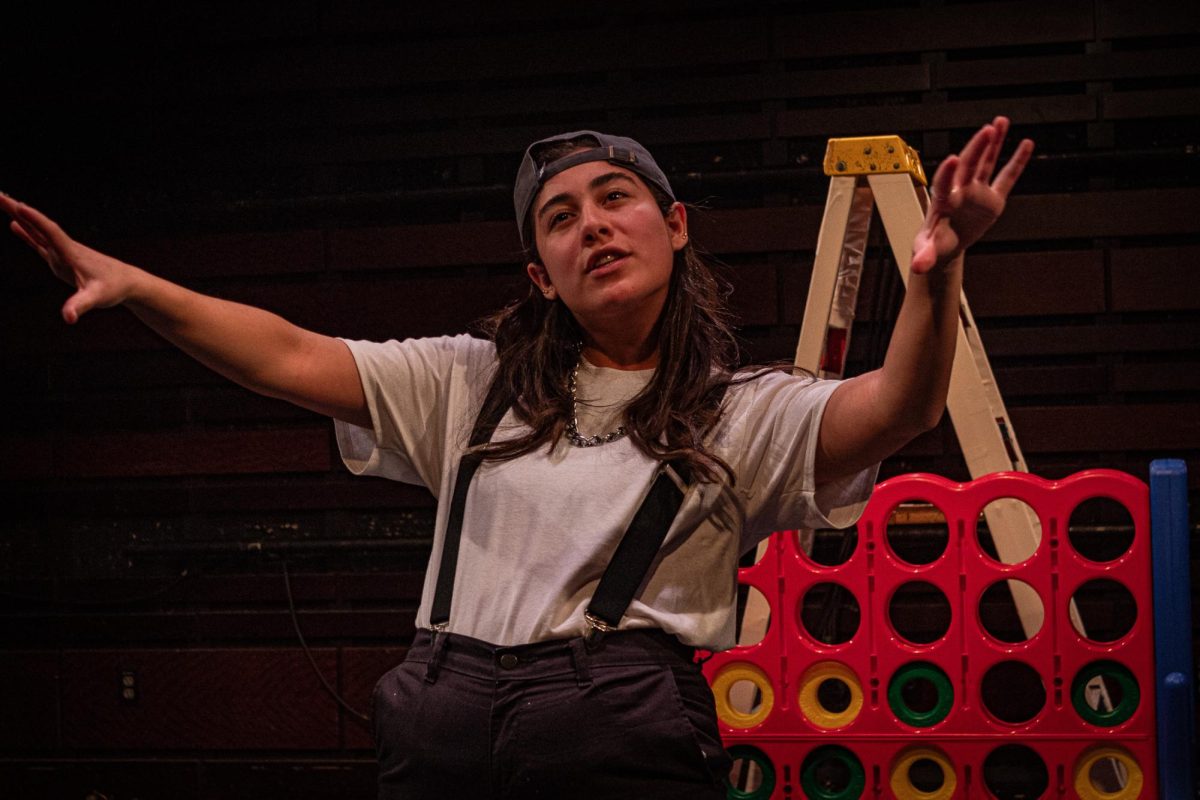“The Minotaur” by Anna Ziegler delivers a modern retelling of a story exploring control and the human experience, with tales of Greek legends, mythical beasts and young love. At Fordham Lincoln Center, “The Minotaur” ravaged audiences with its witty humor and complex characters throughout its run at the Kehoe Theater from Oct. 5-7.
The actors in “The Minotaur” — empowered by the direction of Yev Gelman, Fordham College at Lincoln Center (FCLC) ’24 — give stellar performances and connect audiences to the fully fleshed out characters.
At the beginning, we are introduced to Ariadne (Riley Halpern, FCLC ’25), the daughter of King Minos of Crete, and her brother, the Minotaur (Mariana Miranda, FCLC ’27), who was born when their mother became infatuated with a bull. This sibling dynamic is the heart of “The Minotaur,” and although Ariadne holds resentment toward the Minotaur for burdening their family, she still deeply loves him. Their profound performances were the driving forces behind this production.
Theseus (Cade Parker, FCLC ’26), a warrior set out to kill the Minotaur, becomes a love interest for Ariadne despite her connection to the Minotaur. The warrior is the charming yet slightly arrogant hero of the original story. His legacy and his incredible Black Adam tank top charms her enough to — presumably — Facebook stalk, as well as give him the tools to kill the Minotaur.
One of the strongest parts of the play follows when Theseus makes it through the Labyrinth, where he and the audience face the question of what a beast really is. How can we call the Minotaur a beast for no reason other than the way he was born?
The play handles the complexity of determining what makes a beast while contrasting it with the Minotaur’s actions. Miranda’s character is fully realized, though, as his past cruelties toward those in the Labyrinth are brought before him and he no longer defends himself. This scene fully displays Parker and Miranda’s talents, as it depicts the Minotaur’s death and the haunting screams that followed left a lasting impression on the theater.
Throughout the story, we are led by the Chorus — a priest (Kei Sugae, FCLC ’26), a rabbi (John Stengel, FCLC ’26) and a lawyer (Evan Woodfill, FCLC ’27). Their witty banter and chemistry steal the show and lead the narrative in its given direction. The audience perceives their judgment as fact throughout the play, but when Ariadne and Theseus leave Crete after the Minotaur is killed, it becomes apparent that they don’t act for the good of the characters. Here, they move away from the story the Chorus wants to happen. Instead of heading to Athens, Ariadne and Theseus stay on a remote island and make a new life for themselves, no longer controlled by the world around them. They cast away the Chorus and rest in their solitude.
The play has a lot to offer but never loses sight of its central themes. Though the story handles topics reigning from familial trauma to young love, the audience never feels overwhelmed by this multitude of ideas. The viewers can focus on one part of the story and develop their own interpretations to it. No individual is tied to one narrative or one interpretation, similar to the lesson demonstrated by the ending of the play. As Theseus says, “This story is everything and nothing.”
The set helps accentuate this as well. Consisting only of one ladder, as the Minotaur’s prison, the actors are able to dominate the stage without the assistance of large set pieces to make this play visually interesting. Aside from the ladder, a ball of yarn is used to its full advantage, acting as the magic weapon leading Theseus through the Labyrinth. The characters interact with it while using it to confine the story to the given space. When Ariadne and Theseus decide to abandon what is set out for them, the yarn is physically cut and no longer confines them to the narrative.
These creative set pieces not only assist in the blocking of the characters, but also are able to be physically altered and act alongside the plot.
“The Minotaur” gives a hilarious yet deeply emotional take on the Greek tale and its abundance of lessons. The clear direction from Gelman along with the talent of the cast delivers a fantastic show.


